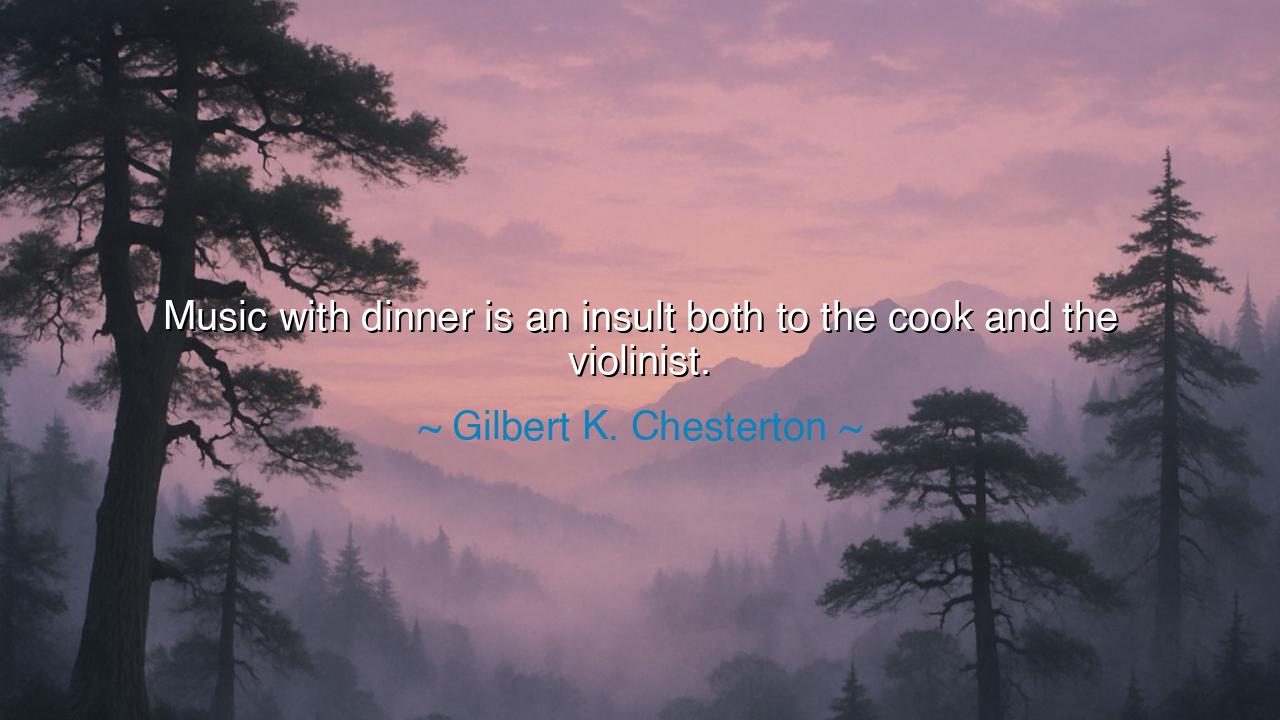
Music with dinner is an insult both to the cook and the






When Gilbert K. Chesterton declared, “Music with dinner is an insult both to the cook and the violinist,” he was not merely jesting about table manners. He was unveiling a profound truth about attention, honor, and the way we treat the labors of others. To play music during a feast, he argues, is to rob both crafts of their dignity—for one cannot truly savor the dish if one is listening to the song, nor can one truly honor the song if one is busy chewing the dish. Each deserves its own altar, its own reverence, its own moment of undivided devotion.
The ancients themselves taught that no offering should be divided. In the temples of Greece, the hymns of the poets were not sung while the priests butchered the sacrifice, but each act was given its own solemn space, so that the gods might be properly honored. Likewise, the Romans in their banquets gave time for eating, time for poetry, and time for discourse, understanding that to blend them all together was to diminish each. Chesterton’s words are born from this same wisdom: that the works of human skill should not be reduced to background noise, but celebrated as the fruits of mastery.
Think of the cook, who rises early, who selects each herb with care, who toils by fire and knife to weave flavors into harmony. To eat without attention, to let the music distract, is to fail to honor the hidden labor that turns hunger into joy. And think of the violinist, whose bow trembles with years of discipline, whose soul pours itself into each note. To play while people clink spoons and chatter over plates is to make sacred sound into mere furniture for conversation. In truth, both arts—culinary and musical—are degraded when forced to serve as accessories to one another.
History gives us examples of this insult and its correction. In the courts of kings, musicians were often made to play during feasts, their genius reduced to background amusement. Yet the greatest masters—men like Beethoven and Mozart—did not compose for idle chatter but for rapt attention. When Mozart’s works first resounded in Vienna, those who spoke over his notes were rebuked, for the composer demanded the silence that art deserved. Here is the heart of Chesterton’s saying: that true art, whether of the tongue or of the ear, demands full presence, not half-hearted distraction.
This teaching is more than about food and music—it is about how we live. We live in an age that is ever distracted, that seeks to do two things at once and ends by doing neither well. Chesterton calls us back to reverence, to the act of giving one thing our whole soul. Whether in conversation with a friend, in prayer, in work, or in pleasure, let us not insult the moment by dividing our attention. For to divide is to dishonor, but to devote is to sanctify.
The lesson for us is clear: when you eat, taste fully; when you listen, listen deeply; when you create, create wholly. Do not seek to mix sacred labors into background noise. Instead, live each act as if it were a ceremony. Thank the cook by honoring the meal. Thank the musician by hearing every note. In this way, you will transform ordinary experiences into holy encounters.
Practically, this means setting boundaries in daily life. Put away distractions when speaking with loved ones. Eat without the hum of a screen. Sit in silence when music plays. Train your soul to give its whole attention to each craft, each person, each act. By doing so, you honor both the giver and the gift.
Thus, Chesterton’s quip becomes a timeless commandment: do not let art, labor, or life itself be reduced to mere background noise. To combine music with dinner is not refinement, but diminishment. Celebrate each in its own moment, and in so doing, you will learn the deepest art of all—the art of presence.






AAdministratorAdministrator
Welcome, honored guests. Please leave a comment, we will respond soon